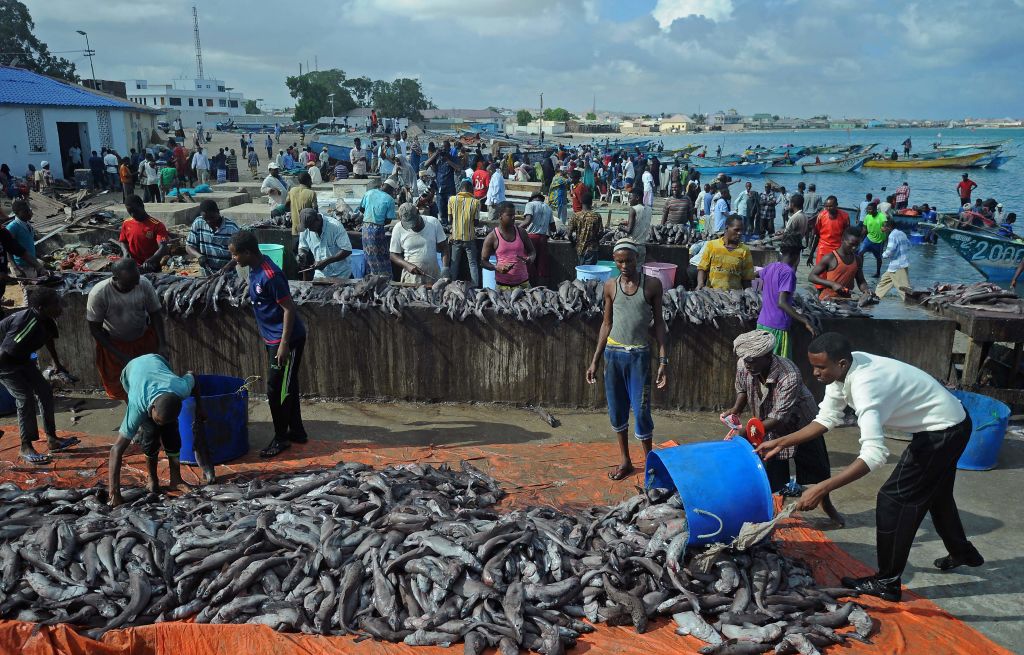Turkey is helping strengthen Somalia’s battle against illegal, unreported and unregulated fishing and other sea crimes.
The two countries in 2024 signed a memorandum of understanding that established the Turkish Armed Forces as a maritime security and law enforcement partner with Somalia for 10 years. Turkey agreed to reconstruct, equip and train the Somali Navy while receiving 30% of the revenue generated from Somalia’s exclusive economic zone. This means Turkish warships could soon be patrolling Somali waters, analyst Ada Baser wrote in the Columbia Political Review.
Turkey has a history of helping enhance Somalia’s security sector. This includes selling it drones, training elite units, establishing the Camp TURKSOM military base and participating in airstrikes against al-Shabaab. Additionally, Turkish companies run the Mogadishu International Airport and Mogadishu Sea Port.
Ankara’s promise to build Mogadishu’s naval capacity “will likely bear fruit — enhancing the latter’s ability to control its maritime zone, apprehend illegal vessels, curb toxic dumping and avert piracy in collaboration with Turkey’s navy,” Institute for Security Studies’ (ISS) researchers Samira Aden Abdi and Halkano Wario wrote for the Enhancing Africa’s Response to Transnational Organized Crime, or ENACT, project.
IUU fishing, often committed by Chinese industrial trawlers, costs Somalia $300 million annually and threatens the livelihoods of up to 90,000 artisanal fishermen. China commands the world’s largest distant-water fishing fleet and is by far the world’s worst illegal fishing offender, according to the IUU Fishing Risk Index. Of the top 10 companies engaged in illegal fishing globally, eight are from China.
It isn’t just China pillaging Somali waters. Vessels from Iran, South Korea, Spain, Taiwan and other countries also operate there illegally.
A Mogadishu-based researcher who requested anonymity said operators of some foreign vessels have illegally obtained fishing licenses. “There is no way for the government to know how much fish has been taken as they rarely report back,” the researcher told the ISS. “They process the fish and export to international markets.”
The issuing of licenses from semiautonomous regions such as Puntland and Somaliland complicates fishing license enforcement. For example, the Puntland Ministry of Fisheries and Marine Resources can issue fishing licenses for more than a year, which is longer than the Somali federal government standard of three months.
In December 2018, Abdillahi Bidhan, then the fisheries minister of Somalia, signed a $1 million deal allowing Chinese companies to fish within 24 nautical miles of the country’s shores. Somalia’s Ministry of Fisheries and Blue Economy told the ISS the agreement would be renewed based on annual independent stock assessments. It is still active and local fishermen say they have seen Chinese trawlers that do not abide by local laws.
“They [trawlers] get so close to shore when they’re looting fish and they’re armed,” Mohamud Khalid Hassan, a town elder in Eyl, told Al Jazeera. “All we can do is stand on shore and watch as it happens. We are powerless.”
These deals also lack transparency, Mohamud Nur Hasan, a member of the Parliamentary Subcommittee on Fisheries and Natural Resources, told the ISS.
Illegal fishing has led to the decline of Somalia’s highly sought-after yellowfin tuna to a near collapse. In September, Somali authorities unveiled new standard operating procedures (SOP) for licensing tuna-fishing vessels operating within the country’s nearly 1.1-million-square-kilometer economic zone, Seafood Source reported. The plan is to help reduce illegal fishing activities committed by semi-industrial and industrial vessels, while boosting opportunities for artisanal fishermen.
“This initiative aims to promote sustainable fishing practices, enhance regulatory transparency, and support local economic development within Somalia’s maritime boundaries,” Somalia Fisheries Director General Abdi Dirshe told Seafood Source. “The introduction of these SOPs and guidelines marks a significant milestone in Somalia’s efforts to regulate its tuna fishing industry responsibly.”
According to the European Parliamentary Research Service, illegal fishing is linked to other transnational organized crimes, including money laundering, corruption and slavery aboard fishing vessels. It has also been cited as a justification for piracy.
In late November 2024, a band of armed and angry Somali fishermen seized a Chinese fishing trawler with the Liao Dong Yu fleet, 30 miles offshore, that was operating under fishing licenses obtained from semiautonomous Puntland authorities and therefore not tracked by Somalia’s Ministry of Fisheries and Blue Economy. According to the Horn Observer, the trawler’s license was obtained from the Puntland Ministry of Fisheries and Marine Resources in September 2020 and had expired in September 2024. Hijackers released the vessel and its 18-man crew in mid-January 2025 for a reported $2 million ransom.
One of the hijackers told Al Jazeera that he and the other fishermen were not pirates but members of “a community under siege,” accusing Chinese vessels of overfishing and threatening the livelihoods of local Somali fishermen.

